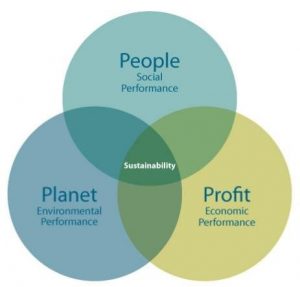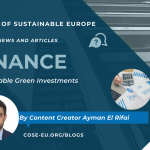Written by: Ayman El Rifai
Reading time: 5 minutes
What is sustainability?
From hunter-gathering to farming to finally capitalism, globalization of businesses, and complication of politics, our world is evolving quickly. Since humans have always been consumers of the earth’s natural resources rather than replenishers, it is crucial to consume our limited resources sustainably. By definition, sustainability is the ability of the current generations to satisfy their needs without compromising the ability of the future generations to satisfy their own needs. In other words; it is the ability of human beings to coexist with our planet’s environment. One way of achieving this goal is by implementing a concept called the triple bottom line approach.
What is the triple bottom line approach?
Developed in 1994 by the British author and entrepreneur John Elkington, the triple bottom line approach is a concept that shaped the way corporations operate, make business, and even measure their performance. Within this framework, organizations do not only reflect on their financial profits when assessing their success over time or when competing with their rivals, but they also started taking into consideration their contributions to both society and the environment. Being said, this approach is also used as a tool for helping organizations set goals towards achieving sustainable development in a way that fits both their abilities and needs. The triple bottom line approach has three main interdependent pillars; social, environmental, and economic pillars, which are also called people, plant, and prosperity, referred to as the three P’s as shown in the figure below.

The first pillar, people
Achieving social sustainability means ensuring that all members of a society have equal rights and opportunities as well as a reasonable standard of living. The organizations’ role is to help maintain and even enhance the wellbeing of its stakeholders, whether primary like its employees or secondary like the community of the city it operates in. Every business should be aware of its corporate social responsibility (CSR) towards its various stakeholders and contribute to the well-being and the environment. One first and important step might be to ensure both a friendly work environment and an inclusive workplace. In addition to that, businesses can foster ethical practices in their cultures, partner with NGOs and non-for-profit organizations that work towards reducing social injustice, ending famine, and enhancing human rights, as well as encourage their own employees to contribute in volunteering initiatives. To evaluate a community’s social sustainability, many dimensions could be measured and used such as the region’s unemployment rate, the average household income, or the country’s level of crime rate.
The second pillar, planet
Achieving environmental sustainability means ensuring that we are not consuming our resourcing in a way faster than it can be renewed (Ehrgott, 2011). Everyone from individuals to businesses and governments should be aware of the consequences of their actions on our planet. In fact, research done by the Yale School of Environment shows that the number of people alarmed about the climate change crisis in the United States has tripled and went from 11% to 31% only in a matter of five years, respectively in 2014 and 2019. Recently, businesses have been adopting ways of production in which the environmental waste is minimized and selling eco-friendly products that people tend to prefer buying over purchasing cheaper and more damaging products since they tend to be pricier. In fact, another study shows that more than 80% of consumers believe that it is crucial for companies to start developing items that are more environmentally conscious. One way of evaluating the environmental viability is by measuring the carbon footprint of a company or a geographical region. Many governments have set policies that put a benchmark to the carbon emission of their local factories. Between 2004 and 2019, the carbon emissions in Sweden significantly decreased by 30%, making it a European leader in sustainability (Tiseo, 2020).
The third pillar, prosperity
Achieving economic sustainability means maintaining economic growth and stability for the people of a community by securing a safe job with good working conditions and living wages. For business, this means making profit, and for most of them, it is the reason they were founded in the initial place. Even though prosperity is a crucial element for the company’s survival and high performance, with the triple bottom line approach, businesses do not see it as their only goal anymore. According to a study done by Deloitte, 95% of the managers in the business world claimed that they are working on integrating economic sustainability into their companies by devoting a significant number of resources to social causes. Implying a sustainable business strategy is seen as an attractive factor for investors which, in return, allows businesses to perform better.
Laura Kohler, Senior Vice President and head of Kohler’s Stewardship and Sustainability programs said: “We believe that in order to grow our business responsibly, we must have programs in place that positively impact the environment and society as scale”. She added; “As a global company, we understand that how we do business impacts the communities in which we live and work”.
For many years, it was noticeable that this pillar of sustainability is taken more into consideration than the two others in the eyes of businessmen who mainly focus on increasing their net worth. The dominance of the economic pillar was also apparent with the withdrawal of the United States from the Paris Climate Change Agreement solely for financial advantage and growth (Burch, 2016). A nation’s prosperity could be evaluated by measuring the job growth and the employment distribution by sector.

Picture by: Ayman El Rifai
Acting for the future of the triple bottom line approach
Putting this approach into practice can have multiple challenges from the three perspectives of sustainability, especially when it comes to measuring the environmental aspects. Many NGOs are fighting for climate change by pressuring the governments to change their laws, however, we should not depend on them only. Sustainability should be first achieved at the individual level before the organizational and corporate entities since it is everyone’s responsibility to aim for a better future. We should therefore always act locally and think globally.
 “Ayman El Rifai is our content creator from Lebanon with a Bachelor’s degree in Business Administration from the American University of Beirut. He joined Circle of Sustainable Europe (CoSE) because he believes in the importance of adopting a sustainable approach in our everyday activities and on the corporate and governmental levels.”
“Ayman El Rifai is our content creator from Lebanon with a Bachelor’s degree in Business Administration from the American University of Beirut. He joined Circle of Sustainable Europe (CoSE) because he believes in the importance of adopting a sustainable approach in our everyday activities and on the corporate and governmental levels.”
References

